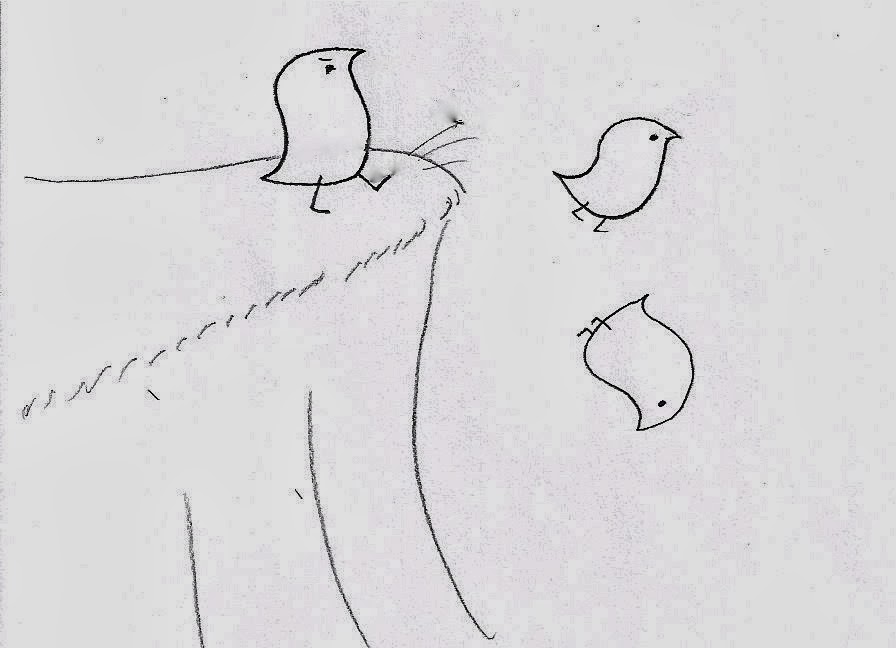It's time for LAB ADVENTURES!
The lab I work in is tracking the language production of bilingual kids (Spanish/English bilinguals). We record them telling us a story and then we type what they said into a computer program, where we code their utterances for grammar.
The lab I work in is tracking the language production of bilingual kids (Spanish/English bilinguals). We record them telling us a story and then we type what they said into a computer program, where we code their utterances for grammar.
When kids are acquiring language, they go through phases where they "overgeneralize" rules. That is to say, they've learned a rule, such as "-ed" = past tense, and then they use that rule even in situations where it's not necessary (such as irregular verbs). That's how we get utterances like "goed" and "wented", or even "falled".
The fact that the regular rule is overgeneralized here can be explained by Pinker's description of the dual route model of word retrieval...
...and many linguists' observation of the U-shaped Curve.
A slightly more complicated circumstance is transitivity. Transitive verbs are verbs that can take an object. Like "kick." You can kick a soccer ball, a shin, or a brick wall. Or "eat." You can eat a pizza, a bowl of oatmeal, or some brains. But "sit" is NOT a transitive verb. The following sentence is ungrammatical in adult Standard American English (SAE):
*Mary sat John.
Mary can sit on John (owch), but she cannot do the verb "sit" to "John" like in the above sentence.
When children are learning about how verbs work, they learn the rule that some verbs are transitive (can take an object). And at first, they tend to overgeneralize this rule. They will make verbs like "fall", which really can't take an object in SAE, and use it to mean "to make fall"—which must take an object. Consider the title of this post, which is an utterance I might encounter in the lab any day:
"And he falled them off the cliff."
This is super cool because first of all, notice that "falled" should be "fell". The child is overgeneralizing the past tense marker used for regular verbs here.
And second of all, "fall" is NOT a transitive verb. That sentence is totally ungrammatical in SAE. But this is a natural part of language acquisition in children! (For the minimalists out there, they've added a causative node (vP), and for the semanticists, they are adding an argument.) Either way, it looks to me like they're overgeneralizing the rule that verbs can become transitive. Or at least overgeneralizing a particular argument structure. There are plenty of documented examples of children saying things like "She poured the cup with milk", which is again applying a different argument structure to the verb.
After a while, children learn that they've been overgeneralizing and learn to apply the rule(s) at appropriate times. That's when their grammar comes to resemble adult grammar.
Someone in my lab pointed out that the child might either not know the word "push" (unlikely, I think), or that they just retrieved another word while searching for the word "push". These are possible, but this happens too frequently (and systematically), in my opinion, to blame it all on errors instead of overgeneralization. Furthermore, Steven Pinker (and other semanticists) might argue that even if they were replacing "push", they are still overapplying a transitivity rule. But the semantics argument, while super awesome, is a discussion for another day.
Regardless of the cause of such utterances, I sure do enjoy them!




Etymologically there is a transitive form of "fall": to fell (from old English fellan, "to cause to fall", cognate with German fällen), as in "He felled many trees with his trusty ax." But you're right about your general argument that "fall" nowadays is never transitive, but kids naturally want to overgeneralize it. It happens with many verbs in English, as I'm sure you've covered in your Language Acquisition class. Human language and its Universal Grammar is versatile like that.
ReplyDeleteYou spell "ouch" and "okay" funny. :-p
ReplyDelete